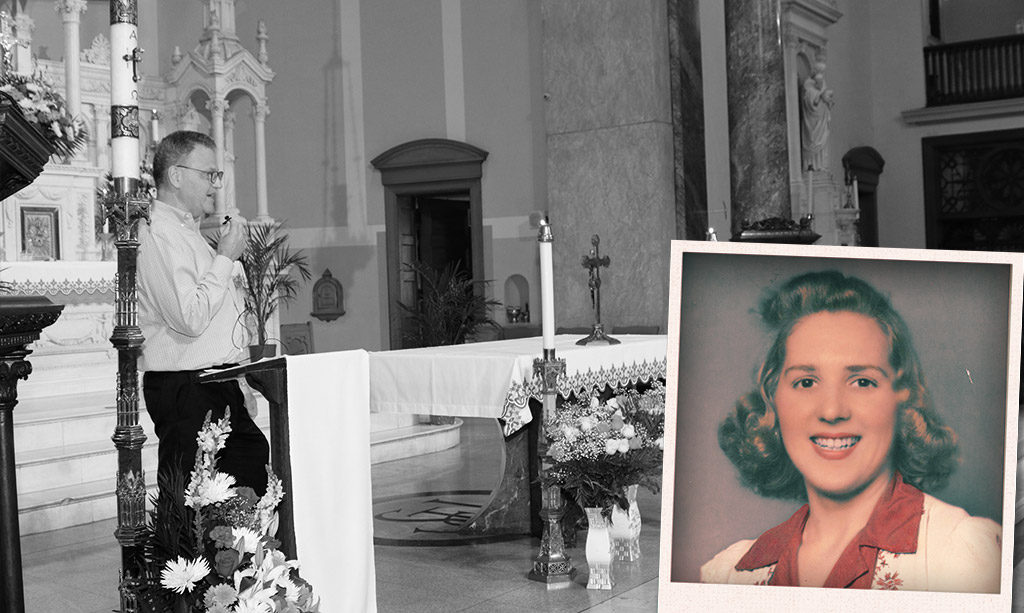
Uncle Matty is my childhood hero. When his D-Day rifle was located in March 2016, I felt an obligation and a calling to tell his story. Telling that story consumed me and took over my life. The result was an 18-month journey to write my book “Uncle Matty Comes Home.”
Writing my book has opened up many hidden feelings for me. The most profound and emotional feeling I think about every day now is, “What was my Mom feeling when I was deployed overseas?” Sadly, I never asked and will never know. In my research for my book, however, I did get a glimmer into what she may have been feeling. To me it is important to share my feelings because perhaps it will help young soldiers see the importance of talking about their feelings with their love ones before being deployed. Back in the 1970s, in my family, we did not share these feelings.
My mother and her brother Matty were as close as a brother and sister could be. She adored him, and they did everything together. On Christmas Eve in 1943, my mother watched Matty walk down the block on 138 th Street in the South Bronx on his way to being deployed overseas for the upcoming invasion of Normandy. She confided to my sister Liz that her eyes were glued to his every step. She could not look away until he was out of sight.
Mom had had a premonition this would be the last time she would ever see her beloved brother Matty. Sadly, her premonition came true. Matty was killed in action on the battlefield in Normandy in June 1944. I imagine from this point forward my mom would dread, fear, and cry for anyone she knew who being deployed overseas. Any deployment must have been traumatic for my mom.
All during World War II, my mom would send postcards to all the friends of her brothers Matty and Jimmy who had been deployed overseas. In fact, she would send postcards to anyone she knew in the neighborhood who was deployed. It was a passion of hers. Many of these postcards were returned because the recipients had been killed in action. My mom would recall the horror of a widow getting notified that her husband had been killed in action, always remembering the nonstop screams and crying of the poor lady. For my mom, the thought of anyone being deployed would cause nightmares that followed her throughout her life. Those nightmares would be the cause of many sleepless nights and endless crying.
In 1974, I was an 18-year- old kid, growing up in the troubled South Bronx. Violence and danger were everywhere. There were gangs, fights, drugs, murders – you name it – we had it. I had a dead-end job as a clerk in Edison Savings & Loans. Many kids turned to drinking, drugs, and living what was then called “on the wrong side of the streets.” Feeling proud about the military and not looking at a good future in the Bronx, I decided to volunteer and enlist in the Army. I would serve at Fort Lewis, Washington, and at Camp Ames, South Korea. Never during this time did I ever think that my Mom might be worried. I never asked her, and I never knew.
In South Korea I was stationed at a missile storage base that housed bombs, including nuclear warheads. In August 1976 at Panmunjom, two American officers were killed with axes during a routine assignment of cutting down a tree. This incident became known as the “The Axe Murder Incident” and caused quite a tense standoff on the Korean Peninsula. As a result, we were mobilized for what was called Operation Paul Bunyan. Our mission was to escort and guard munitions from our Battalion that needed to be placed up North near Panmunjom.
Henry Kissinger advised President Ford, recommending an all-out bombing of North Korea. Luckily for us, President Ford decided against; and, in a show of force during Operation Paul Bunyan, the tree was eventually cut down with no further escalation. Again, I never gave a thought to what my mother was feeling during this time. I never asked her, and I never knew. My only correspondence during this period would be to my sister Liz who would keep me informed and pass along my thoughts.
Upon returning home in April 1977, my family threw me a big welcome home party. During the party, my Mom whispered to me, “Thanks for staying safe.” I never thought about this comment until after I wrote my book. My sisters Liz and Pat now tell me how worried my Mom was during my service in the Army and my deployment to Korea. I never knew then because I never asked. Now I know and can appreciate how my Mother worried, stressed, and had some sleepless nights worrying about me during my Army days. I am glad I know now; but if I could offer a piece of advice to anyone deployed, talk to your love ones. They are worried about you, and are part of your deployment even if it is only in spirit.
